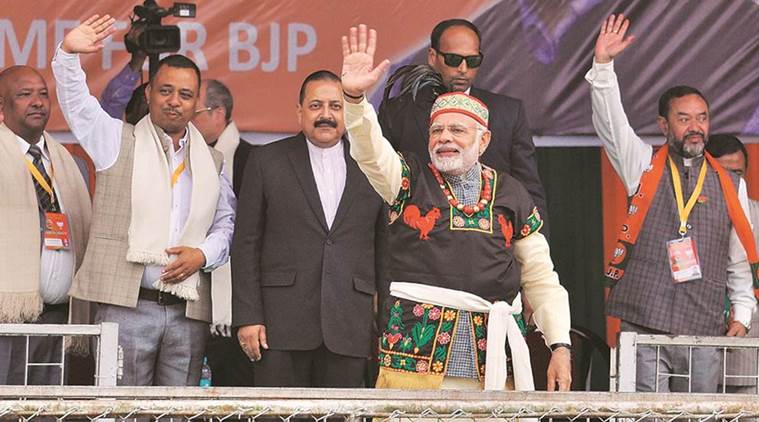Opinion Why PM Modi is talking infrastructure and development in Meghalaya
For a PM who is intuitive and can read the signs well, Narendra Modi must have realised the exuberance and spontaneous warmth he experienced in his last visit in May 2016 was somehow missing this time around.
 Prime minister of India Narendra Modi wave towards the crowd during public rally Rally for Change at Jawaharlal Nehru Stadium ,Shillong Meghlaya on Saturday 16th December 2017.Photo-DASARATH DEKA
Prime minister of India Narendra Modi wave towards the crowd during public rally Rally for Change at Jawaharlal Nehru Stadium ,Shillong Meghlaya on Saturday 16th December 2017.Photo-DASARATH DEKA  PM Narendra Modi waving towards the crowd during public rally Rally for Change at Jawaharlal Nehru Stadium, Shillong, Meghlaya on Saturday.(Express Photo/Dasarath Deka)
PM Narendra Modi waving towards the crowd during public rally Rally for Change at Jawaharlal Nehru Stadium, Shillong, Meghlaya on Saturday.(Express Photo/Dasarath Deka)
Prime Minister Narendra Modi is a consummate leader. He knows when to say what and at what pitch. This is his second visit to Meghalaya, where the BJP is yet to find space for a toe-hold, leave alone a foothold. Hence the Prime Minister has listed out the development agenda of the BJP if it is voted to power. Infrastructure, Modi says, is the mantra for development, while the BJP will make tourism a booming business for Meghalaya so that its burgeoning youth population finds gainful employment.
The PM listed out all the things that are wrong with Meghalaya in the 15 years of Congress (mis)rule. He went as far as calling the Congress-led Meghalaya United Alliance (MUA) Government with Dr Mukul Sangma at the helm as a government of and by the mining mafia. Perhaps Modi is not properly briefed that his own party has promised the coal mine owners, who have been crying foul against the National Green Tribunal (NGT) ban on coal mining, that they would work towards lifting the ban. How they are going to do so, of course, is not spelt out. But Modi himself called Meghalaya a rich state with coal, limestone and granite beneath its earth.
The Prime Minister should be informed that at least three of the major rivers of Jaintia Hills, where the bulk of Meghalaya’s coal deposits lie, have been poisoned and are devoid of all marine life. Coal mining was banned after a student body from Assam, a lower riparian state, filed a case with the NGT stating that the waters of the rivers Myntdu, Lukha and Lunar flowing towards Assam are so poisoned that their water is no longer fit for human consumption.
For Modi, the Shillong visit is just a teaser. He did a virtual inauguration of the Shillong-Nongstoin NH 106 and the Nongstoin-Rongjeng stretch (NH 127(B) that is completed at a cost of Rs 2,300 crore. Modi said this road has been hanging fire until his government came to power and speeded up the construction process. So far so good. But when the PM began to take on the Mukul Sangma government the barbs were no longer hidden. He called it a government that reeked of scam after scam after scam.
Well, Modi should also know that the alleged scamsters, which include veterans of the Congress party, have now jumped ship. They have joined the National Peoples’ Party (NPP), founded by late P A Sangma, which is an affiliate of the NDA Government at the centre. The only reason they are not joining the BJP upfront is because they find it difficult to convince their voters about a party that is perceived to be intolerant of minorities and which even intrudes into their eating habits. The NPP is a fig leaf for these turncoats.
Truth be told, after 2014, when Modi became Prime Minister, many in these hills also wanted to experience the change that he promised. After all, development (never mind what each person’s description of it is) is what everyone desires. The PM’s promise to end corruption was an attractive proposition.
But after 2015, when the gau-rakshaks went amok killing people suspected of carrying or storing beef in their homes, people became wary. Since the Church in Meghalaya is an important and influential figurehead with a captive audience, the whisper campaign against the BJP started in right earnest. It didn’t help that the BJP in Meghalaya did not have a credible face to counter the series of allegations against the party.
And then the BJP found its mascot in KJ Alphons, the Keralite who spent his younger days at a seminary in Meghalaya and later joined the civil services. Alphons is the Christian face of the BJP and he has been made the election-in-charge of Meghalaya. So at the Shillong rally on Saturday, titled Rally for Change, Alphons said it out loud, “I am a practising Christian and so is my wife and I have no problems about being in the BJP. It is wrong to suggest that BJP is anti-Christian.”
To Alphons one would like to remind that Christians in other parts of the country are minorities and live desperate lives. In the North East, the states of Nagaland, Mizoram and Meghalaya are Christian-majority states. In the 1960’s, Arunachal Pradesh, then known as North East Frontier Agency (NEFA), sought to pass the Freedom of Religion Bill to prevent people from converting to Christianity. The tribal Christian people stood as one to oppose this Bill and succeeded in preventing it from being implemented in Assam which then comprised all the state of the North East, barring Tripura, Manipur and Sikkim.
The Rally for Change was lacklustre and comprised largely of people from the rural areas of Meghalaya who had been rounded up as a show of strength by the local BJP honchos. For a Prime Minister who is intuitive and can read the signs well, Modi must have realised the exuberance and spontaneous warmth he experienced in his last visit in May 2016 was somehow missing this time around. To be fair to the PM, he said all the correct things and stressed only on development. Not once was Rahul Gandhi mentioned although the Congress Party was blamed for the poor health indicators in Meghalaya, despite its chief minister being a medical doctor himself.
Modi also rattled off figures that the central government would be releasing, almost making it sound as if that amount would only flow if the people in Meghalaya elected the BJP to power. He, however, mentioned one point that might resonate with the people of the North-East. The North Eastern Council founded in 1972 to provide a roadmap for a nuanced development of the region was only taken seriously by Morarji Desai as PM when he sat through the meeting and that happened a second time when Modi himself sat through another such meeting in 2016.
His ministers, Modi says, have been told to visit the North Eastern states at least once in 15 days, not just for a flying visit but also an overnight stay which would include a visit to some rural outback. The ministers have been doing so faithfully, but the outcomes are yet to be visible.
Incidentally, in Mizoram, where Prime Minister Modi went to inaugurate the Tuirial Hydro Power Project, the powerful NGOs of the state namely the Young Mizo Association (YMA), the Mizo Zirlaii Pawl (MZP) and the women’s organisations boycotted his visit. The reason? They felt slighted that the PM could only spare one hour of his time for the people of Mizoram. For a PM who says that his ministers must not just visit but ensure that they also spent a night in the state of their visit, Modi seems to have faltered. The tribes are emotional people. If they take to a person they will go out of their way to embrace him, but if their pride is injured it will take a while before they forget the snub.
At the end of his speech, Modi could not resist the exhortation of Bharat Mata ki Jai, and Vande Mataram with his fists tightly clenched. Sadly the tribes of Meghalaya, who are at best diffident about public expression of emotions, are yet to comprehend why this open demonstration of patriotism is at all required. The evolution from a tribal principality with 37 chieftains to a nation-state called India is still a work-in-progress. It is important for a Prime Minister to learn to respect these difficult civilisational processes.




